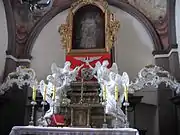Wincenty Kadłubek
Wincenty Kadłubek (c. 1150 – 8 March 1223) was a Polish Catholic prelate and professed Cistercian who served as the Bishop of Kraków from 1208 until his resignation in 1218.[2][1] He was also a noted historian and prolific writer.[2] His episcopal mission was to reform the diocesan priests to ensure their holiness and to invigorate the faithful and cultivate greater participation in ecclesial affairs on their part.[3][1]
Wincenty Kadłubek | |
|---|---|
| Bishop Emeritus of Kraków | |
 | |
| Church | Roman Catholic Church |
| Diocese | Kraków |
| See | Kraków |
| Appointed | 28 March 1208 |
| Term ended | 1218 |
| Predecessor | Fulko |
| Successor | Iwo Odrowąż |
| Orders | |
| Consecration | May 1208 by Henryk Kietlicz |
| Personal details | |
| Birth name | Wincenty Kadłubek |
| Born | c. 1150 Karwów, Kingdom of Poland |
| Died | 23 March 1223 (aged 72-73) Jędrzejów, Kingdom of Poland |
| Alma mater | |
| Sainthood | |
| Feast day | 8 March |
| Venerated in | Roman Catholic Church |
| Beatified | 18 February 1764 Saint Peter's Basilica, Papal States by Pope Clement XIII |
| Attributes |
|
| Patronage | |
The process for his canonization proved quite slow despite initial momentum to see him proclaimed as a saint.[1] The cause languished for several centuries until 1764 when Pope Clement XIII beatified him.[2]
Life
Kadłubek was born in 1150 in Karwów near Opatów as the second of three children to the nobleman Stefan.[3][2] His two brothers (in order; he was the middle child) were Stefan and Boguslav.
Kadłubek first studied in Stopnica before he studied at the cathedral school in Kraków. It was while at the latter that he studied under Mateusz Cholewa. It was his patronage that saw Kadłubek sent abroad for further studies.[3]
He studied in France at the college in Paris as well as at the college in Bologna. Some sources suggest that he met the future Pope Innocent III at Bologna when the two were students and it was further said he once encountered John of Salisbury.[1] He completed his studies in 1185 and returned home where he was ordained to the priesthood before 1189 and served as the provost for the Sandomierz Cathedral; some sources suggest that he served as he principal of the cathedral school in Kraków.[3][2] In 1194 he moved to Sandomierz but returned to Kraków in 1207. It was after the death of Fulko - the Bishop of Kraków - that he was chosen to succeed him as the new bishop. Pope Innocent III confirmed the decision in a papal bull on 28 March 1208 and Kadłubek received his episcopal consecration from the Archbishop of Gniezno two months later. Innocent III's bull referred to Kadłubek's wisdom as the motivation for his selection while referring to him as a "master and preacher". He set out reforming the diocesan priesthood to ensure their holiness while also seeking to invigorate the faithful to active participation in ecclesial affairs.[2] He also supported the construction of monasteries in the diocese. He also consecrated Saint Florian's Basilica and was said to have once been the chaplain to Casimir II the Just.[3] Kadłubek ordained as a priest the Dominican friar Ceslaus.[1]
The bishop was noted for his linguistic skills and for his charismatic preaching; Kadłubek was known also for his expertise in canon law and for his approach to philosophical subjects as well as for his expertise in rhetoric.[2] He knew of the natural sciences well since he had learnt them while in Paris and Bologna. But it was while in Europe that he started reading into the life and works of Saint Bernard of Clairvaux and became enthralled with the charism of the Cistercians whom he granted favors to as bishop.[1]
He followed Gallus in further developing the idea of the Latin proverb "vox populi vox dei" ("the voice of the people is the voice of God") and argued that the ruler (king) should follow a council that includes bishops and representatives of clans since not the ruler but the council has higher power originating from the laws that God instituted. He also claimed that the council should elect the ruler and that rulers abusing their power should be removed from their position. In 1215 he participated in the Fourth Council of the Lateran. In 1218 he resigned from his diocese (after Pope Honorius III accepted it) and entered the convent in Jędrzejów. He became the first Pole to join the Cistercians. He had sent his resignation letter to the pope either in summer or autumn 1217 and spent that summer in Paris.
Kadłubek died on 8 March 1223 and his remains were buried before the high altar of the convent church. His remains were exhumed on 26 April 1633 with his pallium found intact though his remains had become skeletal. Measurements were taken and it was surmised that he was of "fair height".[1] His remains were moved to a new location before the high altar on the following 16 August. Kadłubek's remains were again exhumed and reinterred in mid-1765 and some were moved to Sandomierz in 1845 for veneration. Other parts to his remains were moved in 1903 to Wawel and placed in a silver urn.[2][3]
Beatification

In 1634 the Polish episcopate made a petition to Pope Urban VIII requesting his canonization. In 1650 the Bishop of Kraków Piotr Gembicki appointed a tribunal to hear witnesses for the cause but the commission never began its work which suspended the cause.[1] Bishop Jan Małachowski - in 1683 - petitioned Pope Innocent XI to canonize the late bishop. Innocent XI requested the Congregation for Rites to begin an investigation which took place from 1688 to 1692. But the congregation concluded that there was no reliable evidence to prove his heroic virtue which suspended the cause once again. In 1682 the king Jan III Sobieski petitioned for his beatification. The Order of Cîteaux made similar request in 1699 at their General Chapter.[3] The Polish episcopate made another request to Pope Clement XII to canonize him but the process that the pope requested came to the same conclusion as the previous one.
In 1761 the king Augustus III sent two letters to Pope Clement XIII requesting the canonization which prompted the pope to order another process of investigation. That investigation proved to be successful for Clement XIII issued a papal bull in which he beatified the late bishop on 18 February 1764.[2] On 9 June 1764 the pope issued another bull that allowed for a Mass and the Divine Office to be said in his honor in Kraków and among the Cistercians.
He is referred to in Poland as a saint despite the fact that he has not been canonized as such; Cardinal Stanisław Dziwisz referred to Kadłubek as a "saint" in 2008.[2] Since 2 January 2016 he has been the patron for Jędrzejów.
Efforts to resume the cause
There had been several efforts since his beatification to resume the cause and achieve his canonization though each attempt failed. Cardinal Stefan Wyszyński and Karol Józef Wojtyła (the future Pope John Paul II) both supported his cause in 1964 with Wojtyła referring to the late bishop as the "Father of Polish culture".[1]
In 1972 the Congregation for the Causes of Saints concluded that there was no reliable or available documentation that could confirm Kadłubek's heroic virtues thus suspending the cause which has not continued since.[1]
Works

His best-known work - Chronica seu originale regum et principum Poloniae (Chronicles of the Kings and Princes of Poland) - is a historical compendium of Poland in four volumes.[2] The first three volumes take the form of a dialogue between Archbishop John of Gniezno and Bishop Mateusz. The first volume's sources are legends while the second is based on the chronicle of Gallus and the last two are based upon Kadłubek's own experiences.
This work had a huge impact on the Polish political doctrine of the 14th and 15th centuries co-authored by Stanisław of Skarbimierz as well as on later works of Wawrzyniec Grzymała Goślicki. These ideas led to the Nobles' Democracy in Poland for it is in his works that for the first time the terms res publica (see Commonwealth and Rzeczpospolita) were used in the context of Poland. Some suggest that the book was written at the request of Prince Casimir II; others suggest that it was made at the request of Prince Leszek while Kadłubek was a bishop; still others claim that it was not written until after his retirement.[4]
References
- "Beato Vincenzo Kadlubek". Santi e Beati. Retrieved 14 October 2017.
- "Blessed Vincent Kadlubek". Saints SQPN. 6 March 2017. Retrieved 14 October 2017.
- "Blessed Wincenty Kadłubek". The Wawel Royal Cathedral of Saint Stanislaus B.M. and Saint Weneceslaus M. Retrieved 14 October 2017.
- "Blessed Vincent Kadlubek". New Advent. Retrieved 14 October 2017.
External links
- Hagiography Circle
- Catholic Online
- The Catholic Encyclopedia
- Academia
- The forthcoming first English critical edition of the "Chronica Polonorum" on Academia.edu
- The forthcoming first English critical edition of the "Chronica Polonorum" on ResearchGate
| Catholic Church titles | ||
|---|---|---|
| Preceded by Fulko |
Bishop of Kraków 28 March 1208–1218 |
Succeeded by Iwo Odrowąż |